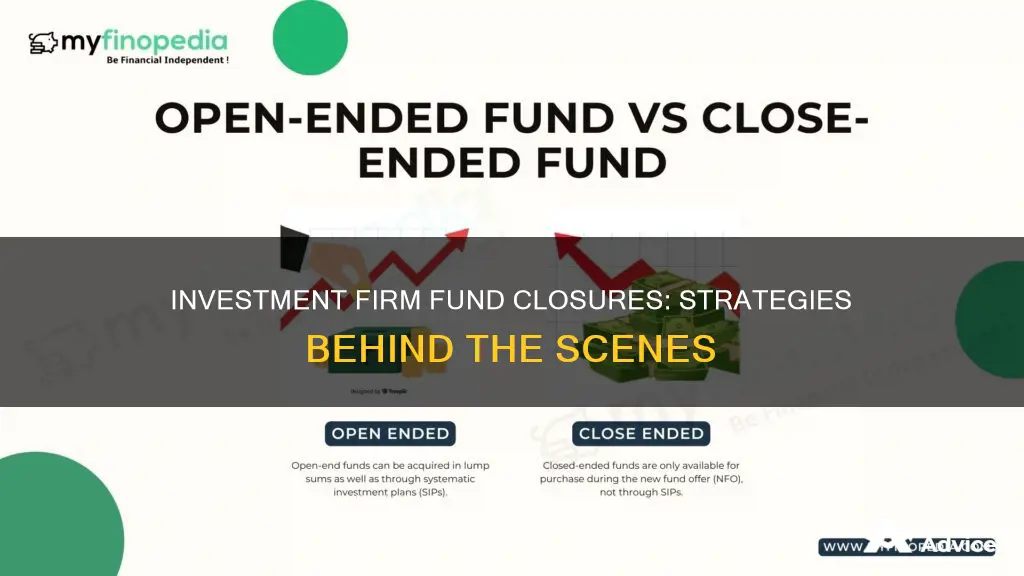
Investment firms close a fund to protect the interests of the fund's investors. When a fund's asset base becomes too large, it can become difficult for fund managers to execute their investing style and strategy. Closing a fund is a way to slow or stop the flow of new money that the fund manager must put to work. This is especially true for smaller-cap funds, where it becomes harder to build meaningful positions in small firms because the increasing amount of money to invest can impact the underlying stock prices. Funds may also close due to poor performance or low demand.
| Characteristics | Values |
|---|---|
| Type of fund | Mutual funds, hedge funds, venture capital funds |
| Reason for closing | To protect investors, to stop inflow of new money, to maintain exclusivity, poor performance, low demand, excessive inflows, asset bloat, compliance with regulations |
| Closure type | Soft close (existing shareholders can still buy shares), hard close (no new money from new or existing shareholders) |
| Impact on investors | Current investors can remain invested in the fund or sell their shares |
What You'll Learn

To protect existing shareholders from poor performance
Investment firms may close a fund to protect existing shareholders from poor performance. This is often done by stopping new investors from entering the fund, either temporarily or permanently. This is because the fund's strategy may be threatened by its size.
When a fund performs well, it attracts new investors, and a large amount of assets can hinder the fund's strategy. For example, small-cap funds deal with low-volume stocks, so a large amount of assets will make it difficult for the fund manager to execute trades. A large influx of cash may also make it difficult for the fund manager to perform trades. Therefore, closing the fund to new investors can protect existing shareholders from poor performance.
Additionally, closing a fund to new investors can help maintain the fund's original investment goals and efficiency. It can also prevent the fund from straying from its desired process or style, which could make it less attractive to shareholders.
It is important to note that closing a fund to new investors is not always a performance-related issue, and current investors should not panic. However, if a fund is performing poorly, closing it to new investors can help improve its operational efficiency and performance.
Fidelity Mutual Funds: Investing in Corporate Debt
You may want to see also

To stop inflow of new money that fund managers must put to work
Investment firms may close a fund to stop the inflow of new money that fund managers must put to work. This is done to protect the fund's investors. If a fund's asset base becomes too large to effectively execute its investing style, it could cause the managers to stray from their process. This is particularly common for smaller-cap funds, especially when small-cap stocks are performing well. As the small-cap fund's assets grow, it becomes harder to build meaningful positions in small firms because larger trades are likely to impact the underlying stock prices.
This is also true for funds that invest in emerging-market securities or other areas of the market that are less liquid. Changing the process to accommodate more money—for instance, moving towards more liquid investments or running the fund in a less concentrated style—increases the probability that the fund will behave differently going forward, dulling its merit for shareholders.
Excessive fund inflows can be a factor for several reasons. They can cause asset bloat, making it challenging for managers to make investments in line with the fund's strategy. This can lead to higher cash levels and inefficient management of capital.
It is worth noting that these concerns apply less to passive or index funds and more to actively managed mutual funds.
Betterment Investment Funds: Where is Your Money Located?
You may want to see also

To maintain exclusivity
Investment firms may choose to close a fund to maintain exclusivity. This is one of the various reasons why mutual funds and hedge funds close their doors to new investors. When a fund closes, investors who are not already invested in the fund are unable to make new investments. Current investors may still be able to add more to their investments, although this is not always the case as closed funds may also stop taking on new investments from current investors.
Funds that are only closing to new investors are likely seeking to minimize inflows while still operating actively. This is because, as a fund grows, the fund manager may find it challenging to execute their desired investment strategy. For example, small-cap funds or focused funds may find that large amounts of assets hinder their strategy. A large influx of cash may also compromise the manager's ability to perform trades efficiently. Closing a fund can be a way to protect existing shareholders from stagnant or declining fund performance.
Funds that invest in small-cap stocks or a small number of securities may be particularly susceptible to asset bloat, which can occur from excessive inflows of capital. This can significantly affect the market and the targeted stocks in the portfolio. As such, funds may choose to close to new investors to maintain the exclusivity of the fund and protect its investment strategy.
Additionally, funds that are registered under the Investment Company Act of 1940 must comply with the 75-5-10 rule, which states that a fund can have no more than 5% of its assets in any one company and no more than 10% ownership of any company's outstanding voting stock. This rule can also be a factor in a fund's decision to close to new investors to maintain exclusivity and comply with regulatory requirements.
Index Funds: Choosing Your Path to Financial Freedom
You may want to see also

To wind down and terminate
A fund may be winding down and terminating if it has ceased to exist, which can happen if it fails to perform and investors withdraw their money. This is different from a closed fund, which is a fund that is either closed to investors temporarily or permanently but is still operational.
A fund may also be winding down and terminating if it is liquidating following the announcement of its closing. In this case, the management investment company will sell all of the assets in the fund following a predetermined schedule and provide investors with the proceeds. Alternatively, fund companies may merge shares of a fund with another existing fund.
Funds may also close to new investors due to poor performance when a fund is winding down. However, this is not always the case as closing to new investors can also be done to improve the fund's operational efficiency and performance.
It is important to note that closing a fund usually protects existing shareholders, and current investors should not panic.
Maximizing HSA Funds for FI: Where to Invest Wisely
You may want to see also

To comply with the 75-5-10 rule for diversified funds
Investment firms close a fund to comply with the 75-5-10 rule for diversified funds. This rule, established by the Investment Company Act of 1940, sets out the requirements that a fund must meet to be classified as a diversified fund.
The rule states that 75% of a fund's assets must be invested in other issuers' securities, with cash and cash equivalents such as T-bills or money market instruments included in this 75%. No more than 5% of the fund's assets can be invested in any one company, and the fund may not own more than 10% of any company's outstanding voting stock. These requirements are in place to ensure that funds achieve true diversification, which is one of the primary reasons investors buy shares in an investment company.
Funds that are classified as diversified tend to be more attractive to investors during times of market turbulence as they are considered less risky due to their spread of assets. However, it is important for investors to do their due diligence and ensure that a fund truly is diversified, as many funds cut the SEC rules closely, and the majority of a fund's assets can sometimes be concentrated in just a few stocks.
By closing a fund, investment firms can protect the fund's investors and ensure that the fund's managers do not stray from the process and continue to execute the fund's investing strategy effectively. This is especially important for smaller-cap funds, where it can be harder to build meaningful positions in tiny businesses as the fund's assets grow.
Super Funds: Where Your Money is Invested
You may want to see also
Frequently asked questions
Investment firms may close a fund to protect the fund's investors. If a fund's asset base gets too large to effectively execute its investing style, it could cause the managers to stray from their process.
A closed fund is a fund that is either closed to investors (temporarily or permanently) or has ceased to exist. Funds primarily close because the investment advisor has determined that the fund's asset base is getting too large to effectively execute its investing style.
A closed-end fund has a fixed number of shares, generally invests in specialized sectors, and trades like a stock on a stock exchange.
The first option is to close only to new investors, meaning that existing investors can still buy more shares. The second option is to close to all investors, meaning no one can purchase more shares.
Reopening often follows a spell of poor performance or large outflows from many investors selling their shares. Both events reduce the fund's assets, so if the managers can run more money just as potently, they might let in newcomers.







